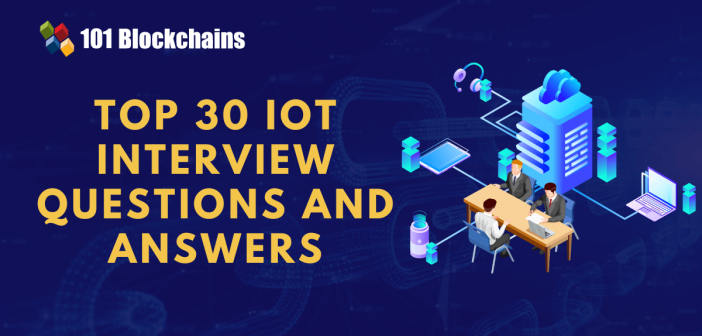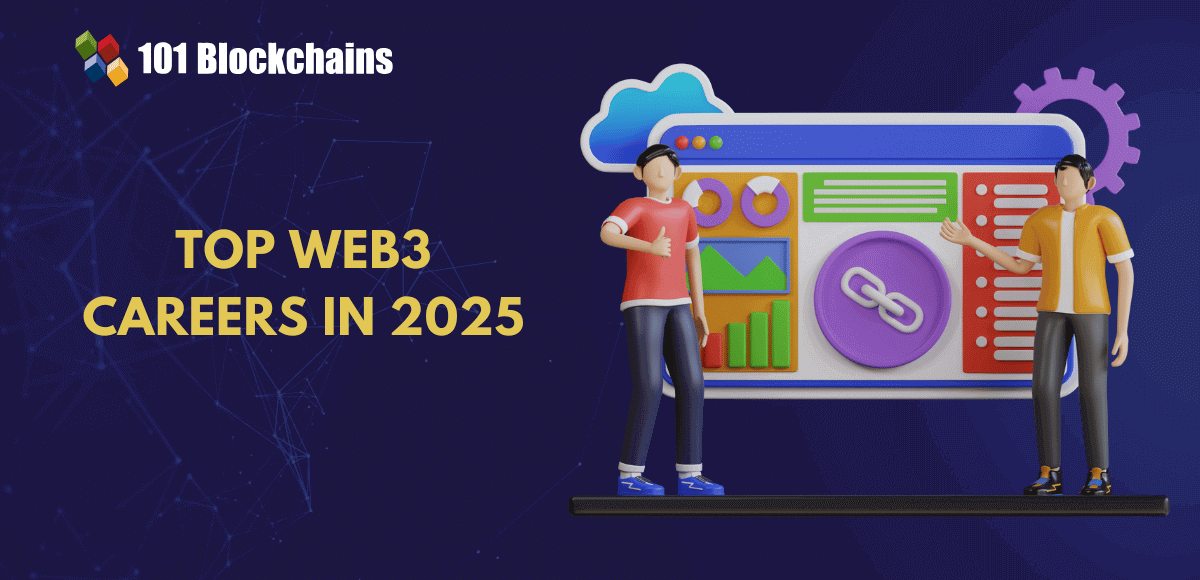Learn how blockchain truly works, master key definitions, and uncover what makes smart contracts so "smart." Dive into the fundamentals, gain valuable insights, and start your blockchain journey today!

- Career Guide
James Howell
- on March 27, 2023
Top 30 IoT Interview Questions and Answers
Preparing for your upcoming IoT interview? Go through these top IoT interview questions and get ready for your interview.
The Internet of Things or IoT presented the foundations of a new revolution in connectivity alongside ensuring innovative functionalities with internet-connected devices. The number of connected IoT devices worldwide was around 9.7 billion in 2020. As of 2022, the total number of connected IoT devices has reached almost 13.1 billion, and the count will increase to 15 billion in 2023.
On top of it, the demand for IoT jobs has been experiencing steady levels of growth in recent times. Some of the popular roles of IoT tech professionals include IoT engineer, IoT consultant, IoT architect and IoT researcher. In addition, other emerging roles in the IoT job market include IoT technical program manager, IoT software development engineer and IoT specialist.
The average annual salary of an IoT engineer ranges between $110,000 and $130,000, thereby indicating lucrative career opportunities. Therefore, candidates interested in pursuing a career in IoT seek IoT interview questions to prepare for job interviews. If you want to pursue the career path of an IoT professional, you need to complete training courses and certifications to earn the skills and knowledge required in real IoT use cases. However, awareness of interview questions could help in improving your confidence. Let us find out some of the top questions you can expect in IoT job interviews.
Most Popular IoT Interview Questions
The scope for IoT career prospects has been expanding continuously, with top tech companies seeking IoT professionals. According to LinkedIn, top tech companies offering IoT-related jobs include AWS, Google, IBM, Intel, Accenture and many others. You can ensure better chances of success in landing an IoT-related job at these top companies by preparing for the following interview questions.
Basic Interview Questions on Internet of Things
The first set of IoT questions you can find in a job interview would emphasize the fundamental concepts related to Internet of Things. Here are some of the common basic interview questions you can come across in IoT job interviews.
Want to understand the fundamentals of the Internet of Things (IoT)? Enroll Now in IoT Fundamentals Course!
1. What are the important characteristics of IoT?
The important characteristics of IoT include connectivity, analytics, active engagement, artificial intelligence and scalability. You can find a detailed outline of the functionalities of IoT explained with brief descriptions of each IoT characteristic. Connectivity points to the seamless connection among connected devices or objects, while analytics refers to the analysis of data collected for the development of effective business intelligence systems.
Active engagement would refer to the coordinated working of multiple IoT and cross-platform technologies as well as services. Scalability is an important trait of IoT, which emphasizes the facility of accommodating more devices in the IoT network. Artificial intelligence brings the possibilities of smart capabilities into IoT devices through AI algorithms, networked technologies and data collection.
Want to familiarize yourself with the technology stack associated with IoT? Enroll Now in Internet Of Things (IoT) – Intermediate Level Course!
2. How many components can you find in the IoT device?
The IoT device includes four components such as sensors, connectivity, user interface, and data processing capabilities. Sensors are important components that help in collecting live data from surrounding environments. Connectivity helps in sending the collected data to cloud infrastructure through different communication mediums. The overview of basic IoT examples would also emphasize the importance of data processing in IoT devices through software. Finally, the user interface of the IoT device helps users access the functionalities of the IoT device.
3. Which industries could use IoT?
The list of fundamental IoT interview questions would also test your knowledge of the real applications of IoT. Many industries have adopted IoT in different use cases, and some of the notable examples include healthcare, manufacturing, agriculture, smart cities, consumer devices, utilities and public transportation.
4. What is the value of IoT for healthcare industry?
The importance of IoT in healthcare is evident in the broad range of applications, such as implanted IoT devices and wearable devices. For example, wearable devices could help in the effective monitoring of patient’s health conditions and optimization of healthcare processes. The major impact of IoT jobs in healthcare would also point to improved accuracy in managing medications for patients. At the same time, IoT can also help in improving the management of physical environments in healthcare facilities.
Start learning Blockchain IoT with World’s first IoT (Internet Of Things) Skill Path with quality resources tailored by industry experts Now!
5. Which types of sensors are used in IoT systems?
Internet of Things sensors is an integral component in the IoT ecosystem. Sensors have offered crucial benefits such as better productivity, worker safety and lower costs. Depending on the use cases, IoT systems could use different types of sensors, such as temperature sensors, gas sensors, IR sensors, pressure sensors and motion detection sensors.
6. What are the benefits of IoT?
The Internet of Things or IoT system offers an advanced automation and analytics system with the functionalities of AI, networking, sensors and big data. You can expect IoT questions regarding the value advantages of Internet of Things. IoT can ensure crucial benefits such as better customer engagement, accessibility and technical optimization. Most important of all, IoT could help in exploring new business opportunities based on enhanced insights collected from IoT devices. Furthermore, IoT devices could facilitate effective improvement in security through access control systems.
7. Do you know some real-world examples of IoT applications?
The common interview questions for IoT jobs also emphasize real-world examples of IoT use cases. Smart homes are one of the foremost examples of IoT applications with the use of automatic air-conditioning and lighting systems. Internet-connected vehicles can use sensors and internet connectivity for better operation and maintenance. Similarly, connected health systems could offer precise real-time monitoring of patients and improved healthcare approaches.
Curious to know how the IoT business mechanisms work? Enroll Now in the Internet Of Things Business Impact Course!
8. What are embedded systems in IoT devices?
Embedded systems refer to a combination of hardware, firmware and software configured for achieving a specific objective. It refers to a small computer that you can integrate into mechanical or electrical systems. The embedded system is programmed to offer a fixed functionality. Embedded systems use communication ports for transferring data to peripheral devices from a processor, which is generally a microcontroller or microprocessor.
9. Do you know about the primary hardware components in an embedded system?
The importance of embedded systems in IoT career roles also draws attention to the crucial components of embedded systems. You can find sensors, analog-to-digital converters, processors, memory, actuator and digital-to-analog converters in the embedded system. The architecture of embedded systems could include multiple actuators and sensors.
10. What are the important challenges for IoT?
The uses of IoT in different industries also invite the possibilities for many challenges. The list of challenges with IoT explained for beginners would focus on issues of network connectivity and privacy. In addition, lack of awareness regarding IoT and ambiguous reliability of IoT systems also present challenges for IoT adoption. Another crucial challenge for IoT is evident in the lack of comprehensive testing alongside the use of outdated devices.
Curious to know about learning resources for blockchain IoT? Check the detailed guide Now on What’s The Best Blockchain IoT Skill Path For Me?
Intermediate-Level Interview Questions on Internet of Things
The collection of IoT interview questions would also test the knowledge of candidates regarding technical concepts of IoT. Here are some of the intermediate-level questions you would find in IoT job interviews.
11. How many layers can you find in the IoT protocol stack?
The IoT protocols are an important requirement for safeguarding data alongside ensuring safe exchange of data among connected devices through the internet. Such questions offer viable answers to “What type of technical questions are asked on the Internet of Things (IoT)?” by testing your knowledge of technical concepts.
IoT protocols offer the definition for flow of data through the internet, thereby ensuring secure data exchange among connected IoT devices. The five important layers in the IoT protocol stack include application layer, transport layer, network layer, physical layer and data link layer.
12. Do you know any popular IoT protocols?
The technical interview questions for IoT jobs also test your knowledge of examples of popular IoT protocols. Some of the commonly used IoT protocols include Very Simple Control Protocol or VSCP and Data Distribution Service or DDS protocol. The other important IoT protocols include XMPP, Simple Text Oriented Messaging Protocol or STOMP and MQTT protocol. In addition, AMQP, Zigbee, and Wi-Fi protocols are essential for facilitating desired functionalities in IoT systems.
13. How many types of communication models are used in IoT?
The Internet of Things or IoT landscape is responsible for connecting devices throughout the internet. IoT devices rely on technical communication models to interact with each other. The common types of communication models you would use in an IoT career include request-response model, publisher-subscriber model and push-pull model. IoT devices also rely on exclusive-pair models to ensure continuous connections between clients and servers.
Want to learn how you can use blockchain in the Internet of Things (IoT)? Enroll in Getting Started with Blockchain And IoT Course Now!
14. What is Bluetooth Low Energy or BLE?
Bluetooth Low Energy or BLE is a new Bluetooth technology that involves lower energy consumption. The responses to “What type of technical questions are asked on the Internet of Things?” would emphasize the details of BLE and its implications. Bluetooth Low Energy, also known as Bluetooth Smart, also offers the advantage of lower costs in comparison to classic Bluetooth devices. The higher energy efficiency makes BLE an ideal choice for IoT systems.
15. Do you know the meaning of PWM?
PWM is one of the important aspects of IoT explained with practical implications in IoT use cases. Pulse Width Modulation is the process of changing the amount of power directed toward a specific service. It follows a technique for creating analog signals from digital sources, thereby optimizing the energy delivered to the load.
16. What are the top choices of IoT databases?
Data collection is a significant highlight in the functioning of IoT systems, thereby emphasizing the need for databases. The notable IoT examples of databases would refer to InfluxDB, RethinkDB, Sqlite, Apache Cassandra and MongoDB.
Want to know how blockchain can benefit the IoT sector? Check the presentation Now on Blockchain With IoT – Top Blockchain IoT Use Cases
17. Can you describe the function of a thermocouple sensor?
A thermocouple sensor is an essential tool used in IoT devices that focus on use cases for measuring temperature. It relies on coupling of two metal pieces and the measurement of temperature at the junction of the metal pieces. The metal conductors generate a small voltage, which users can interpret for calculating temperature. Thermocouple sensors offer durability, cost-effectiveness and a wide temperature range, thereby validating their application in different sectors.
18. Which types of IoT sensors are suitable for agriculture?
The list of intermediate-level IoT interview questions also tests your knowledge of the applications of IoT sensors in industries such as agriculture. Airflow sensors help in measuring air permeability of soil, while acoustic sensors help in measuring noise levels from pests. Some of the other popular sensors used in agriculture include chemical, soil moisture and humidity sensors.
19. What are the benefits of edge computing for IoT?
Edge computing can support IoT infrastructure development and management in different ways. You can answer such IoT questions by outlining how edge computing ensures IoT device functionality in limited network connectivity conditions. In addition, edge computing can help in reducing latency alongside network congestion as well as reducing the expected security and compliance risks.
20. How will 5G networks affect IoT?
The emerging array of 5G networks could influence IoT with notable value-based improvements. 5G cellular networks could offer higher bandwidth and faster throughput, thereby enabling applications of IoT in advanced use cases. Manufacturers can use 5G technology for better tracking of device inventory throughout the complete lifecycle alongside optimizing operations and workflows. Most important of all, 5G networks could support IoT adoption on a broader scale in industries such as agriculture and healthcare.
Want to know the best tips to navigate through the career path in blockchain too? Check the detailed guide Now on Top 10 Tips To Start A Career In Blockchain
Advanced Interview Questions on Internet of Things
The multiple questions asked in interviews for IoT-based job roles also include advanced questions for experts. Here are some of the expert-level questions you can come across in IoT job interviews.
21. How is IoT different from IIoT?
IoT or Internet of Things is different from Industrial Internet of Things or IIoT in the fact that IIoT is a subset of IoT. Industrial Internet of Things focuses on industrial use cases of IoT, specifically in manufacturing, oil and gas and agriculture. While IoT examples emphasize consumer-end aspects of device connectivity, Industrial Internet of Things involves actuators and smart sensors for improvement and automation of industrial operations.
22. Can you describe the IoE concept?
The technical questions for experts would also test your awareness of concepts such as IoE or Internet of Everything. It is an overarching concept that extends beyond ‘things’ in IoT and emphasizes connectivity among people, data, processes and other objects. The IoE concept aims to leverage the compound effect of a connection between people, data, things and processes.
23. Do you know about Thingful?
You can face many questions for your IoT career which focus on industry expertise, such as awareness of other tools used in IoT sector. Thingful is one of the popular examples of an IoT search engine. It creates a geographical index for real-time data obtained from connected devices worldwide by sourcing data from existing resources for public IoT data.
Eager to build your career in enterprise blockchains too? Enroll Now in How to Build Your Career in Enterprise Blockchains Course!
24. What is IoT Contiki?
IoT Contiki is one of the crucial tools in the IoT landscape right now. The operating system has been created specifically for IoT devices running on restricted memory, processing power, bandwidth and power consumption. IoT Contiki can help in lightweight and flexible processing of programs, communication, resources, processes and memory.
25. How is an IoT Gateway useful in IoT?
The answers to such questions on IoT explained in detail would emphasize the role of IoT gateways in facilitating communication among IoT devices, systems, sensors and equipment. IoT gateway works on critical functions on data such as encryption, filtering, processing and management alongside protocol translation.
26. What are the basic requirements in IoT device management?
The scope of IoT device management includes provisioning, authentication, configuration, monitoring and maintenance of connected IoT devices and related software. Therefore, IoT device management has to follow specific requirements to ensure plausible results in health, connectivity and security of IoT devices. The important requirements of IoT device management include provisioning and authentication, configuration and control, update and maintenance and monitoring and diagnostics.
Build your identity as a certified blockchain expert with 101 Blockchains’ Blockchain Certifications designed to provide enhanced career prospects.
27. What is Raspberry Pi?
Raspberry Pi is another common highlight you can expect in questions for IoT jobs to test expert-level knowledge. It is a card-sized computer with the power of features such as Bluetooth, General Purpose Input Output (GPIO) pins and Wi-Fi. The features of Raspberry Pi help the computer connect and communicate with external devices alongside controlling them.
28. What is GPIO?
GPIO is the abbreviation for General Purpose Input/output and serves as a productive programmable pin in the IoT infrastructure. The GPIO pins help in controlling the input or output signals with programmed instructions. Most important of all, GPIO works as a common interface for linking microcontrollers with external electronic systems and devices.
29. Which types of testing approaches are recommended for IoT systems?
IoT system testing is also an important highlight in IoT interview questions for expert-level professionals. The different types of testing for IoT systems would emphasize specific aspects such as usability, data integrity, functionality, security, scalability, reliability, connectivity and performance.
30. What are the top security challenges for IoT?
The security concerns in IoT present significant barriers to IoT adoption. Some of the top security vulnerabilities include insecure network services, inadequate privacy protection and lack of encryption for data transfer and storage. In addition, the lack of secure update mechanisms and insecure default settings can also result in IoT security vulnerabilities.
Start your blockchain journey too Now with the Enterprise Blockchains Fundamentals – Free Course!
Final Words
The outline of the top IoT questions you can face in different categories of IoT job interviews shows the extensive research required for becoming an IoT professional. Other than training courses and certifications, you need to hone your knowledge for dealing with different types of interview questions. The interview questions can help you develop your IoT knowledge alongside confidence for pursuing a career in IoT. Learn more about the Internet of Things technology and its practical use cases in detail.






